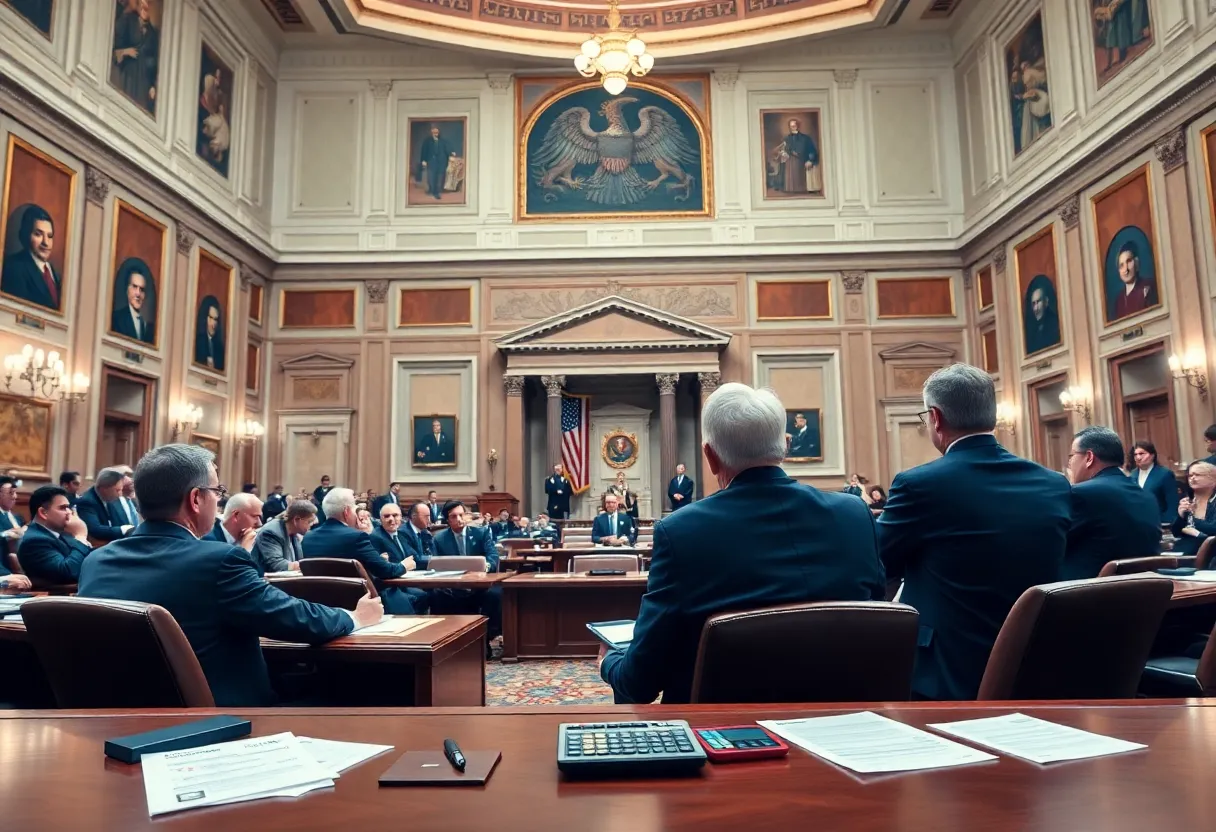News Summary
Senate Republicans have introduced a revised version of their ambitious $4.2 trillion tax and spending package, aiming to address key issues within the party. This updated proposal, nicknamed “One Big Beautiful Bill,” seeks to merge various tax cuts and spending initiatives amidst internal disagreements on healthcare cuts and safety-net programs. As lawmakers work towards a vote, concerns linger over the potential impact of proposed cuts to Medicaid and SNAP. The legislation aims to provide economic security while addressing national defense needs, but the deadline approaches with the GOP facing significant pressure.
Senate GOP Unveils Revised $4.2 Trillion Tax and Spending Package
The Senate Republicans have rolled out a shiny new version of their ambitious $4.2 trillion tax and spending package, all in a rush to meet the impending July 4 deadline set by the President. Dubbed “One Big Beautiful Bill,” this sprawling proposal aims to tie together various tax cuts and spending initiatives that have been a hot topic among the GOP.
New Proposals and Changes
The revised draft attempts to bridge the gap within a divided Republican party, mainly around topics like cuts to safety-net programs and tax breaks for renewable energy sources. This latest package, which has a price tag of $3.3 trillion, includes a medley of features such as the extension of tax cuts, new tax breaks, stringent immigration enforcement measures, and a substantial push for the “Golden Dome” missile defense program.
However, it’s important to note that the Republicans plan to offset these expansive new packages with significant cuts to Medicaid and the Supplemental Nutrition Assistance Program (SNAP). These proposed cuts have sparked quite a debate among Senate Republicans, with some members worrying about the potential consequences on vulnerable communities and healthcare facilities. Concerns are also growing among certain House members who fear the impact of these cuts on low-income families and rural hospitals.
The Path Ahead: Compromises and Conflicts
As the Senate continues to iron out the details of the legislation, a successful vote there means it will need to be sent back to the House for approval, especially since the House had already passed its own version not too long ago. This revision comes after lawmakers, including Treasury Secretary Scott Bessent and House Speaker Mike Johnson, sat down to discuss internal party disagreements centered on healthcare cuts and the state and local tax (SALT) deductions.
One of the highlights of the proposed changes involves the SALT deduction, which allows taxpayers to deduct local taxes from their federal returns. The current cap sits at $10,000, but the new deal would raise it temporarily to $40,000 for five years before reverting back to the original cap. Although a handful of House Republicans have signaled reservations, pushing back for a higher cap for specific income brackets, discussions continue.
Financial Implications and Future Strategies
Proposed cuts to the Medicaid provider tax sparked intense discussions. A ruling by the Senate parliamentarian suggested that these provider tax policies might contravene budget reconciliation rules. To navigate through this issue, Senate Republicans may gradually implement limits and set up a $15 billion hospital bailout fund to assist rural hospitals that depend heavily on Medicaid funding.
As they push forward, Senate Majority Leader John Thune hopes to unveil the text of the legislation by the end of the week. Then, a procedural vote is on the table for Saturday, which raises the stakes considerably for the GOP. With the legislation’s fiscal impact ballooning by $250 billion in light of recent discussions, some members express unease about the growing national debt, which currently looms over $36 trillion.
The Deadline Approach
Throughout this whirlwind of negotiations, there’s been noticeable pressure from the President urging lawmakers to see this bill through, highlighting its significance for both national defense and economic security. While he has shown willingness to extend the deadline to allow for more thorough negotiations, there’s also been a reminder of potential political consequences for those who oppose the comprehensive package.
The new legislation is shaping up to include a tax exemption for tipped income and a fresh tax credit aimed at helping families with homeschooling and private school expenses. With so many moving parts and a deadline fast approaching, it’s clear this is just the beginning of what promises to be an exciting and consequential chapter in the Senate’s approach to tax and spending reforms.
Deeper Dive: News & Info About This Topic
- Washington Post: Trump Tax Bill GOP Deadline
- Wall Street Journal: Trump Tax Bill July 4 Deadline
- Politico: Senate Republicans Tax Cuts Projected to Cost $4.2T
- New York Times: Republicans Tax Increases Trump Bill
- Politico: GOP Handed More Megabill Setbacks
- Wikipedia: Tax Reform in the United States
- Google Search: Trump Tax Bill July 4 Deadline
- Google Scholar: Trump Tax Bill 2025
- Encyclopedia Britannica: Taxation
- Google News: Trump Tax Bill

Author: STAFF HERE AUGUSTA WRITER
The AUGUSTA STAFF WRITER represents the experienced team at HEREAugusta.com, your go-to source for actionable local news and information in Augusta, Richmond County, and beyond. Specializing in "news you can use," we cover essential topics like product reviews for personal and business needs, local business directories, politics, real estate trends, neighborhood insights, and state news affecting the area—with deep expertise drawn from years of dedicated reporting and strong community input, including local press releases and business updates. We deliver top reporting on high-value events such as Arts in the Heart Festival, Westobou Festival, and Masters Week. Our coverage extends to key organizations like the Augusta Metro Chamber of Commerce and Greater Augusta Arts Council, plus leading businesses in manufacturing and healthcare that power the local economy such as Textron Specialized Vehicles, Cardinal Health, and Nutrien. As part of the broader HERE network, including HEREAtlanta.com and HERESavannah.com, we provide comprehensive, credible insights into Georgia's dynamic landscape.


